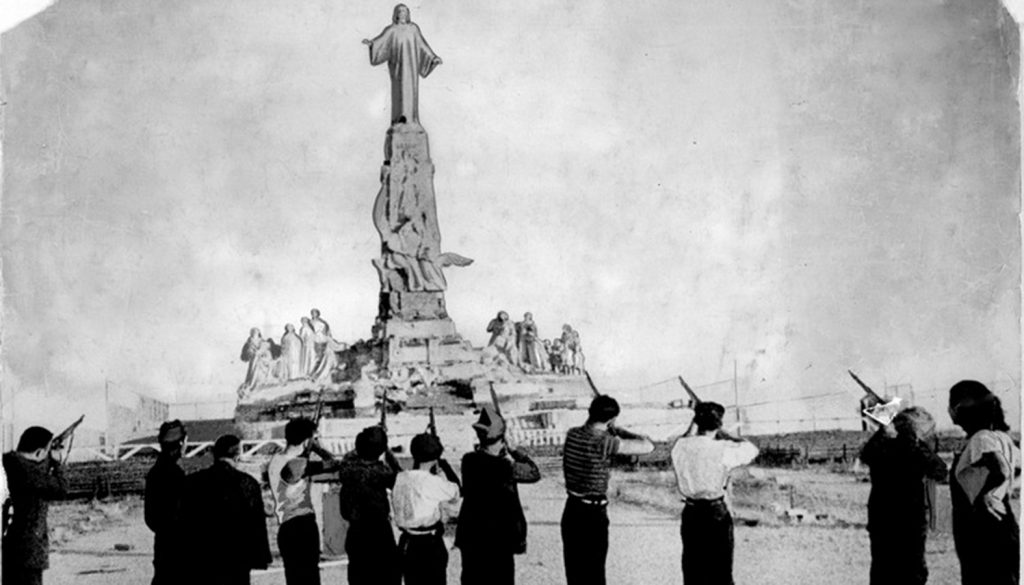Perhaps more than any other English writer of the 20th century, George Orwell’s reputation is that of a truth-teller.
“Animal Farm,” his allegory about the Bolshevik Revolution, was controversial among his fellow leftists because it dared to expose the truth of the communist dictatorship in Russia. His dystopian novel “1984” foresaw a world where history and news were constantly revised to conform to power and ideology.
A lesser-known book of Orwell’s published 70 years ago, “ Homage to Catalonia,” had a similar theme. It is a personal history of the Spanish Civil War, in which he fought with the Republican forces. The book was so controversial Orwell had trouble publishing it in England.
The famous critic Lionel Trilling said about “Homage to Catalonia” that the author “told the truth, and told it in an exemplary way, quietly, simply, with due warning to the reader that it was only one man’s truth.”
Orwell, Trilling wrote, “used no political jargon,” and “made no recriminations,” in the novel. “He made no effort to show that his heart was in the right place, or the left place. He was not interested in where his heart might be thought to be, since he knew where it was. He was interested only in telling the truth.”
But as captivating as his writing may have been, Orwell certainly did not tell the whole truth, omitting some crucial facts about the war.
Soon after enlisting as a soldier in a radical militia, Orwell was sent to the small town of Barbastro, some six months after anarchist forces had taken over the town of 8,000 inhabitants. They murdered 837 of those 8,000, more than a 10th part. The dead included the bishop, almost every priest in the city, and 37 seminarians. A total of 197 priests and religious in the small diocese were killed.
Although he visits the place twice in the space of a year, Orwell makes no mention of the massacres. Instead, we hear about the faded poster of a bullfighter and how he understands the bullfighters had fascist sympathies. Barbastro looked “bleak and chipped,” he tells us, but nothing of the horrors that his comrades had done in the town. Can he have ignored the history? He must have heard about the atrocities of the C.N.T., the anarchist militia sent into Barbastro to counter the nationalist uprising.
Orwell was fiercely anti-clerical, which helps explain his revisionist history. Correcting some of the anti-Franco propaganda, he admits in “Homage” that English anti-fascist propaganda “even descended to the pitiful lie of pretending that churches were only attacked when they were used as Fascist fortresses.
“Actually,” he wrote, “churches were pillaged everywhere and as a matter of course because it was perfectly well understood that the Spanish Church was part of the capitalist racket. In six months in Spain, I only saw two undamaged churches, and until about July 1937 no churches were allowed to reopen and hold services, except for one or two Protestant churches in Madrid.”
Orwell did not write about the burnt-out church in Barbastro, whose baptismal font had been torn out and thrown by the river (it was later rescued and brought to Rome by St. Josemaría Escrivá, who had been baptized in it). He had no words about the school next to the city hall, where local Claretian seminarians were kept prisoner before their execution in August 1936. (They were beatified by St. Pope John Paul II in 1992).
Orwell famously wrote in 1984 that, “He who controls the past controls the future. He who controls the present controls the past.” He knew about the manipulation of history through language and covering up inconvenient chapters.
But when it comes to the Spanish Civil War, “Homage to Catalonia” shows him guilty of the same about the Spanish conflict.
Historian Stanley Payne has compared the violence against Catholics seen in the war to that of the French Revolution: more than 4,100 priests, and nearly 2,400 religious were killed by Republican-allied forces. Orwell knew at least some of this. How did the great truth-teller not mention what Payne considered “the most extensive and violent persecution of Catholicism in Western history”?
The English 19th-century writer Samuel Butler once said that God cannot alter the past, only historians can. Nearly a century later, it is the losers of the Spanish conflict who have won the battle of history.
Most Americans know next to nothing of the violent persecution of the Church in the conflict that tore Spain apart from 1936 to 1939. What they do know about the war, if anything, is probably from the one-sided narratives from respected writers like Orwell or Ernest Hemingway (“For Whom the Bell Tolls”).
The stories of martyrs like Barbastro’s cannot be forgotten: the seminarians of Barbastro and the town’s bishop, Bl. Florentino Asensio; the first gypsy saint, Ceferino Giménez Malla.
There is a book in Spanish titled “The Other Historical Record” dedicated to the 197 Marist Brothers assassinated in Barcelona by the anarchist forces. As the title suggests, the authors are very well aware that many ignore the history they narrate. Those who want to correct the commonly accepted view of the Spanish Civil War are like guerrillas fighting a battle for a history that has been suppressed as inconvenient by an army of official influencers.
“Even Homer nods,” was the poet John Dryden’s famous translation of a line of Horace: Even Orwell, with his reputation of fearless commitment to the truth, erred because of ideology. We need more critical awareness in Catholics, whose opinions increasingly risk being shaped by secular media and their idols. The common cliches of history and of modern thought in general need correction. That is why we need a truly Catholic press and media, which we pray may be true to its mission of evangelizing truth.

